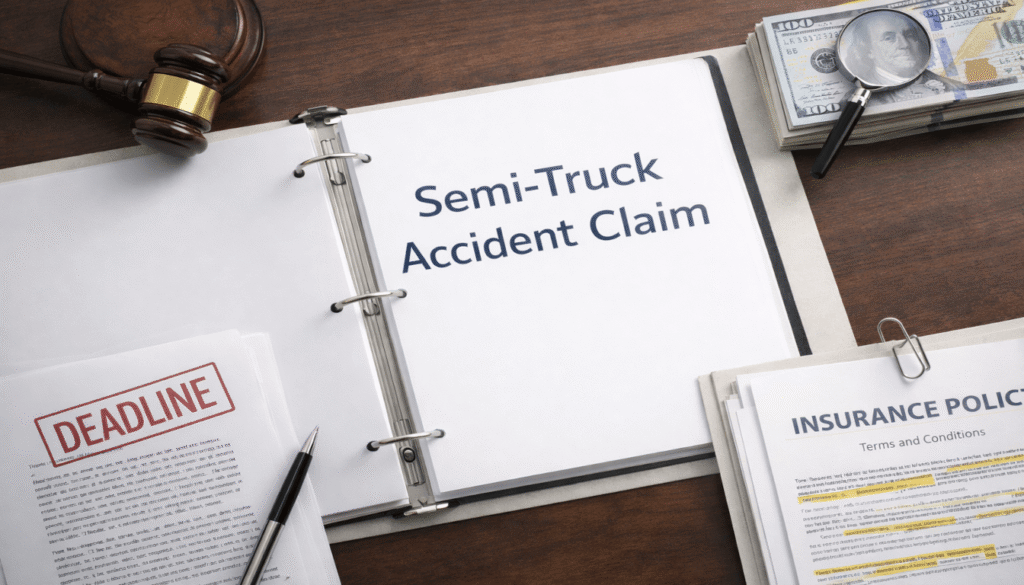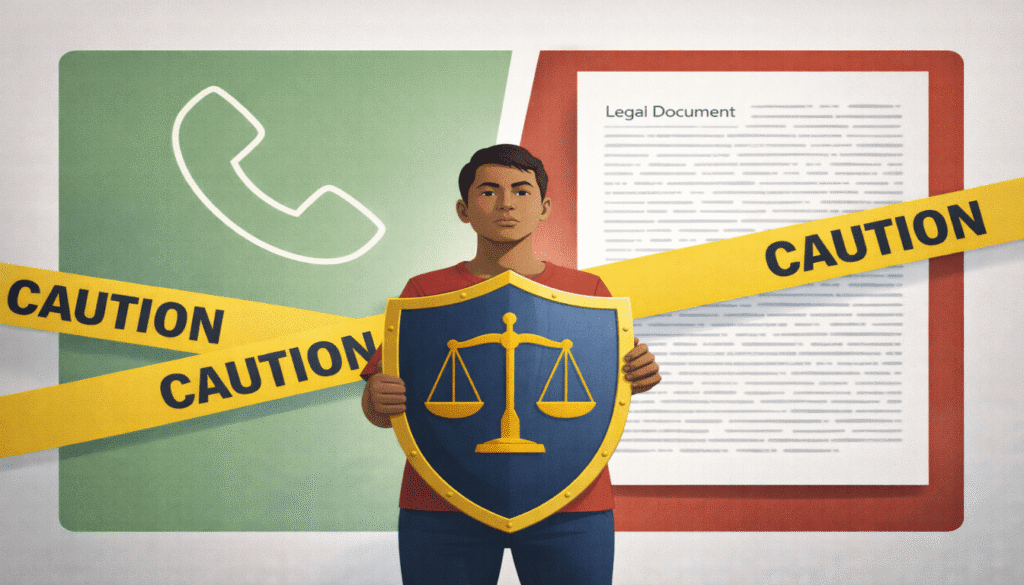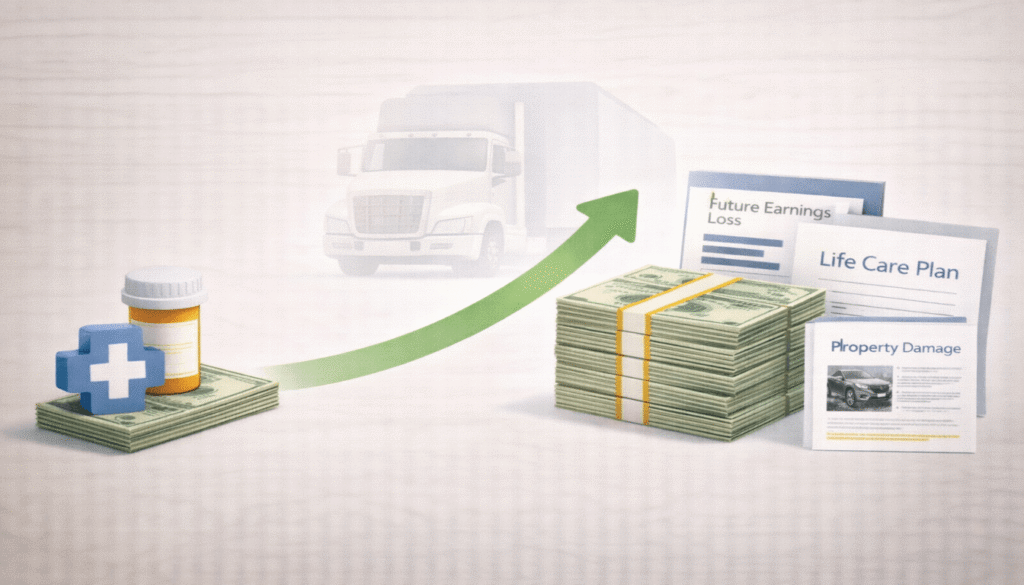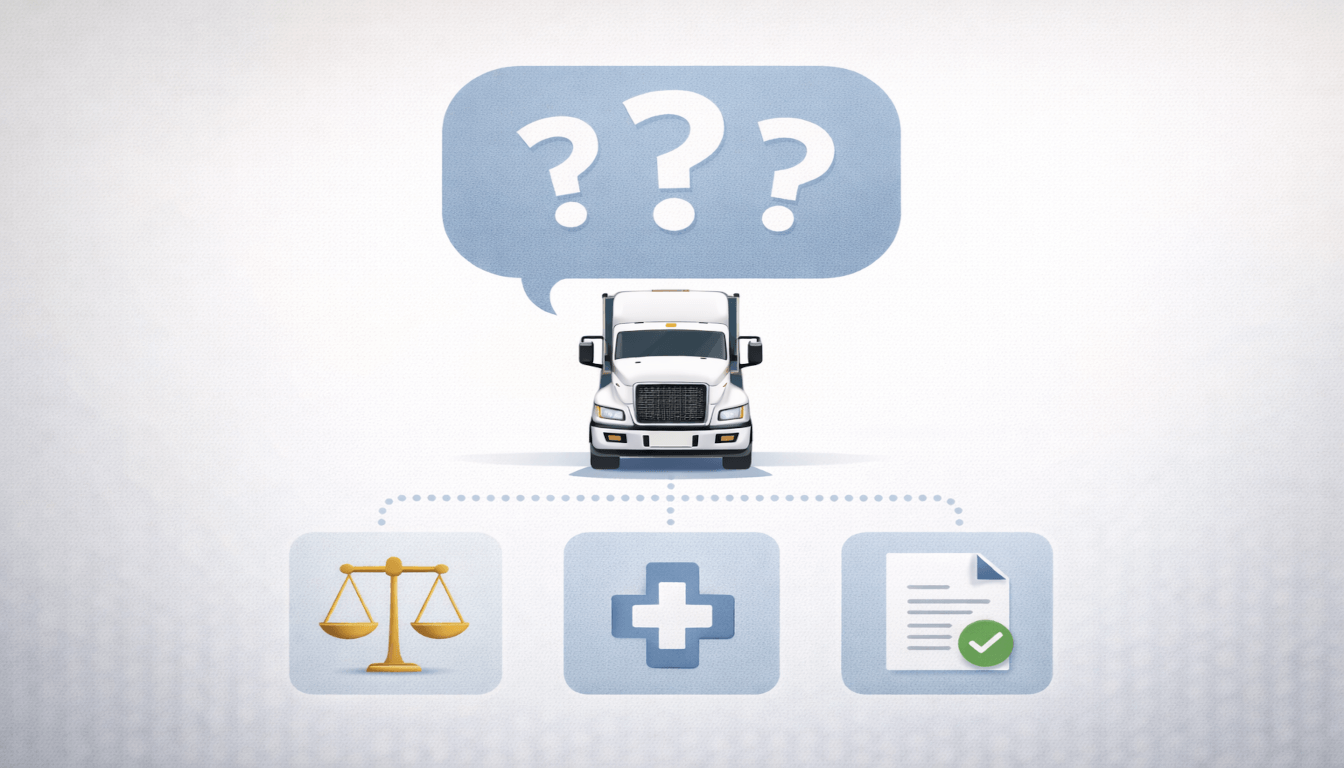What if the most dangerous part of your daily commute isn’t reckless drivers at all—but hidden hours‑of‑service violations in semi‑truck accidents that undermine the very system meant to keep you safe?
Commercial vehicle collisions create devastating consequences. These massive machines can weigh more than 80,000 pounds, and when they collide with passenger cars, the trauma is often severe and life‑altering. Victims face complex legal battles against trucking companies and insurers, making it critical to understand your rights immediately after a crash.
Beyond the physical injuries, survivors often struggle with emotional stress, financial uncertainty, and the overwhelming task of navigating insurance and legal systems. Knowing what evidence to preserve, how to communicate with insurers, and when to seek medical care can make the difference between a fair recovery and a denied claim.
This guide provides essential answers for those affected by these catastrophic events. It covers everything from evidence preservation to compensation claims, helping survivors move from shock toward recovery and legal preparedness. For a step‑by‑step checklist of immediate actions, see What to Do After a Semi‑Truck Accident.
Key Takeaways
- Semi‑truck collisions often result in life‑altering injuries due to massive weight differences.
- Immediate medical attention and evidence preservation are crucial for protecting your rights.
- Trucking companies frequently employ aggressive tactics to minimize settlement offers.
- Statutes of limitations vary by state but typically allow 1–3 years to file claims.
- Proper legal representation significantly impacts compensation recovery outcomes.
- Compensation can cover medical expenses, lost wages, and pain and suffering.
- Detailed investigation is often necessary to establish liability in semi‑truck accident cases.
Semi‑Truck Accident FAQs: Immediate Steps After a Semi‑Truck Collision
The moments following a semi‑truck accident demand clear‑headed action despite the chaos. Victims must prioritize specific steps that protect both their health and their legal rights. The National Highway Traffic Safety Administration (NHTSA) emphasizes that proper documentation and evidence preservation during this vulnerable time often determine the outcome of insurance claims and lawsuits.
Seeking Immediate Medical Attention After a Semi‑Truck Accident
Medical evaluation should occur immediately after any semi‑truck collision. Hidden injuries such as internal bleeding, concussions, or spinal trauma may not show symptoms right away.
Emergency room visits create essential medical records for insurance claims. Follow‑up care with specialists prevents long‑term complications and strengthens your case. Comprehensive documentation supports damage claims for pain and suffering and establishes a clear connection between the crash and your injuries.
Documenting the Semi‑Truck Accident Scene for Legal Protection
Thorough scene documentation provides visual evidence for your claim. Photograph vehicle damage from multiple angles, including skid marks, debris, and road conditions.
Capture traffic signal details, weather factors, and any visible injuries. Collect witness contact information while their memories remain fresh. Obtain the official police report number for future reference—this documentation often proves crucial during settlement negotiations.
Preserving Critical Evidence in Semi‑Truck Accident Claims
Evidence preservation requires immediate action following the crash. Avoid moving vehicles unless absolutely necessary for safety reasons.
Secure the truck driver’s and company’s details promptly. Black box data, electronic logging device (ELD) records, and maintenance files can disappear quickly without proper intervention. An experienced attorney can hire crash investigators to examine the scene, and this professional analysis often proves vital for establishing liability.
These steps create a strong foundation for compensation claims and protect victims from insurance tactics that minimize injury severity. For more guidance on avoiding costly mistakes, see Mistakes to Avoid After a Semi‑Truck Accident.
Understanding Semi‑Truck Accident Investigation Procedures
Semi‑truck accident FAQs often highlight the complexity of investigations. These cases require specialized approaches to uncover the truth. Proper investigation procedures can determine liability and compensation outcomes. The Federal Motor Carrier Safety Administration (FMCSA) stresses that evidence collection must begin immediately after the incident, since time‑sensitive information can disappear without prompt action.

Police Reports and Official Documentation in Semi‑Truck Accident Cases
Official reports provide critical details about the collision scene. Officers document weather conditions, road defects, and visible violations. These records become foundational evidence for insurance claims and lawsuits.
Victims should obtain their copy promptly through proper channels. The report may indicate preliminary fault determination and often includes driver statements and witness observations.
| Report Component | Investigation Value | Timeline Consideration |
|---|---|---|
| Driver Violations | Establishes negligence patterns | Available within days |
| Road Conditions | Contextualizes accident causes | Perishable evidence |
| Witness Statements | Supports victim accounts | Memory fades quickly |
| Vehicle Damage | Indicates impact forces | Document before repairs |
Gathering Witness Information After a Semi‑Truck Accident
Independent accounts provide crucial perspective on the collision. Bystanders often see details drivers miss, and their observations can challenge inaccurate narratives.
Contact information should be collected immediately at the scene. Follow‑up statements help clarify the sequence of events. Witness testimony strengthens reconstruction accuracy and supports liability claims.
Working With Crash Investigators in Semi‑Truck Accident Claims
Specialized experts bring technical knowledge to complex cases. They analyze black box data from the commercial vehicle, revealing speed, braking, and other critical factors.
Investigators examine maintenance records and driver logs, looking for violations of federal regulations that may have contributed to the incident. Their findings often prove essential for establishing liability.
An experienced attorney coordinates these investigative efforts, ensuring evidence preservation and proper analysis. This professional approach maximizes compensation recovery for victims. For a deeper look at how evidence builds strong claims, see Evidence in Semi‑Truck Accident Cases.
Legal Considerations in Semi‑Truck Accident Claims
Semi‑truck accident FAQs often focus on the complex legal landscape surrounding these cases. Understanding key legal principles can significantly impact your ability to recover fair compensation after a devastating collision. The American Bar Association notes that navigating the legal system requires knowledge of strict time limits and liability rules, which determine whether victims can pursue justice through the courts.

Statute of Limitations in Semi‑Truck Accident Cases
Every state sets strict deadlines for filing injury claims, typically ranging from two to three years after the incident. Missing this deadline permanently bars victims from pursuing legal action. Evidence deteriorates and witness memories fade over time, making early consultation with an attorney essential. Legal counsel ensures proper timing and filing before critical deadlines pass.
Comparative Negligence Principles in Semi‑Truck Accident Claims
Many states follow comparative negligence rules in injury cases, meaning victims can recover damages even when partially at fault. Compensation amounts reduce based on the victim’s percentage of blame. Florida and other states apply these principles consistently. Victims should never assume they have no case without legal advice—an experienced team can analyze fault allocation accurately and protect recoverable damages.
Wrongful Death Claim Eligibility After a Semi‑Truck Accident
Family members may file claims when a loved one dies in a semi‑truck accident. Spouses and children typically have standing to pursue these cases. Wrongful death claims seek compensation for funeral costs, emotional distress, lost income, and medical expenses incurred before death. Proving negligence requires thorough investigation and evidence collection, making legal representation crucial for navigating this difficult process.
| Legal Concept | Impact on Case | Action Required |
|---|---|---|
| Statute of Limitations | Determines filing deadline | Immediate legal consultation |
| Comparative Negligence | Affects compensation amount | Fault percentage analysis |
| Wrongful Death Claims | Provides family compensation | Evidence of negligence |
| Company Liability | Expands recovery options | Regulatory compliance review |
Victims should explore all legal avenues promptly after a collision. Delays can complicate claims and reduce settlement opportunities. An attorney can identify multiple liable parties beyond the driver, as trucking companies often bear responsibility for maintenance failures or regulation violations. Proper legal guidance ensures victims protect their rights effectively and maximizes potential recovery for medical care, lost wages, and pain and suffering. For more insights into the unique challenges of these cases, see Why Semi‑Truck Accident Cases Are Unique.
Navigating Insurance Company Interactions After a Semi‑Truck Accident
Semi‑truck accident FAQs often begin with insurance concerns. Victims face complex negotiations with adjusters who prioritize company profits. The National Association of Insurance Commissioners (NAIC) cautions that insurance representatives may appear helpful while working against your interests. Their primary goal is minimizing payout amounts, and understanding these dynamics protects your financial recovery. Knowledge of common tactics prevents victims from accepting unfair settlements.

Common Insurance Tactics to Avoid in Semi‑Truck Accident Claims
Adjusters frequently offer quick, low settlements before injuries fully manifest. These offers may seem attractive but rarely cover long‑term costs. Delaying tactics pressure victims into accepting inadequate amounts.
Insurance companies often dispute liability to reduce compensation responsibility, sometimes blaming road conditions or other drivers. Victims should never accept any offer without consulting an experienced attorney.
- Immediate lowball offers before full injury assessment
- Purposeful delays to create financial pressure
- Liability disputes shifting blame from their driver
- Requesting unnecessary documentation repeatedly
Recorded Statement Dangers in Semi‑Truck Accident Cases
Adjusters may request recorded statements, claiming it is routine procedure. These conversations often become weapons against your claim. Innocent comments about feeling “okay” can undermine injury severity.
Questions designed to elicit partial fault admissions are common, and victims might unknowingly validate alternative crash theories. Always decline recorded statements without legal representation present.
Even casual phone conversations can be misinterpreted. Adjusters document every interaction, looking for inconsistencies. Legal guidance prevents miscommunication from reducing your compensation.
When to Involve Legal Representation in Semi‑Truck Accident Insurance Negotiations
Contact an attorney immediately after any semi‑truck accident or commercial vehicle collision. Legal teams handle all insurance communications from the beginning, preventing bad‑faith tactics and ensuring critical evidence is preserved.
Representation becomes essential in complex cases involving multiple liable parties. Trucking companies often employ teams of adjusters and defense lawyers focused on minimizing payouts. Your attorney levels the playing field during negotiations and litigation.
Early involvement ensures proper case preparation for trial if needed. Attorneys meet all statutory deadlines while maximizing recovery for medical care, lost wages, and pain and suffering. Victims should choose firms with specific expertise in semi‑truck accident cases to secure the strongest possible outcome. For more insights into insurer strategies, see Bad Faith Insurance Tactics in Semi‑Truck Accident Claims.
Compensation and Recovery in Semi‑Truck Accident Cases
Semi‑truck accident FAQs often center on financial recovery after devastating collisions. Victims face complex calculations when determining fair compensation for their losses. The National Highway Traffic Safety Administration (NHTSA) highlights the importance of accurate crash reporting and regulatory compliance, which directly impacts how compensation is calculated in semi‑truck accident cases.

Types of Recoverable Damages in Semi‑Truck Accident Claims
Victims may pursue both economic and non‑economic damages after a semi‑truck accident. Economic damages cover tangible financial losses such as medical bills, lost income, and property repair costs.
Non‑economic damages address intangible losses like emotional distress, reduced quality of life, and loss of companionship. In cases involving extreme negligence, courts may award punitive damages to punish reckless behavior and deter future misconduct.
“The true measure of damages extends far beyond medical bills—it encompasses everything taken from the victim’s life.”
| Damage Category | Compensation Purpose | Documentation Required |
|---|---|---|
| Medical Expenses | Covers treatment costs | Hospital bills, receipts |
| Lost Wages | Replaces income | Pay stubs, employer verification |
| Pain and Suffering | Addresses non-economic harm | Medical records, testimony |
| Future Care Costs | Funds long-term needs | Expert medical projections |
| Property Damage | Repairs or replaces vehicle | Repair estimates, photos |
Calculating Pain and Suffering in Semi‑Truck Accident Cases
This compensation category addresses the non‑physical impact of injuries, considering how the collision affected the victim’s daily life and emotional well‑being.
Attorneys often use multiplier methods based on medical costs, analyzing injury severity, recovery duration, and lifestyle changes. Some cases employ per diem calculations for ongoing suffering. Thorough documentation strengthens these claims significantly.
Factors include inability to enjoy hobbies, maintain relationships, or perform daily activities. Legal professionals help quantify these personal losses for insurance negotiations and courtroom presentations.
Long‑Term Care and Future Expenses After a Semi‑Truck Accident
Serious injuries often require ongoing medical attention for years. These future costs must be calculated during initial settlement discussions.
Projections include surgeries, therapy sessions, and medication needs. Home modifications and assisted living arrangements may also be necessary. Medical experts provide detailed cost estimates for these future requirements, while economic analysts calculate lost earning capacity when injuries prevent returning to previous employment.
Proper valuation ensures victims don’t face financial ruin from ongoing care needs. Insurance companies frequently underestimate these long‑term impacts. An experienced attorney assembles medical and economic experts to build compelling cases, maximizing recovery for all future anticipated expenses. For a deeper breakdown of damages, see Economic and Non‑Economic Damages in Semi‑Truck Accident Claims.
Protecting Your Legal Rights and Securing Recovery After a Semi‑Truck Accident
Semi‑truck accident FAQs empower victims with vital knowledge for navigating post‑collision challenges. Acting swiftly preserves evidence, strengthens liability claims, and ensures compliance with strict legal deadlines.
Victims should seek immediate medical care and consult an experienced attorney. Legal teams manage complex negotiations with insurance companies, preventing bad‑faith tactics and safeguarding compensation opportunities.
Thorough investigation establishes negligence by truck drivers, carriers, or maintenance providers. This evidence supports claims for damages covering medical expenses, lost wages, property repair, and pain and suffering.
Choosing specialized attorneys ensures aggressive representation against trucking companies and insurers. Skilled counsel secures settlements that reflect the full scope of damages, including long‑term care needs and emotional recovery.
Informed decisions protect victims’ rights and promote lasting recovery. Professional guidance makes navigating this difficult process manageable and increases the likelihood of fair compensation. For a step‑by‑step checklist of immediate actions, see What to Do After a Semi‑Truck Accident.
Frequently Asked Questions About Semi‑Truck Accidents: Protecting Your Rights and Recovery
What immediate steps should someone take after a semi‑truck collision?
Victims should prioritize their health by seeking medical care, even without visible injuries. They should also document the accident scene with photos, gather witness contact details, and preserve any available evidence before leaving. Contacting law enforcement to file an official police report is a critical step that strengthens both insurance claims and potential lawsuits.
How does an official police report impact a semi‑truck accident claim?
A police report provides an unbiased third‑party account of the crash. It often includes initial fault determinations, witness statements, and observed violations. This document becomes foundational evidence during the insurance claim process or any semi‑truck accident lawsuit.
What is the statute of limitations for filing a semi‑truck accident lawsuit?
The time limit to file a lawsuit, known as the statute of limitations, varies by state but is typically two to three years from the date of the crash. Missing this deadline usually results in the permanent loss of the right to seek compensation through the court system.
Why should victims avoid giving a recorded statement to an insurance adjuster after a semi‑truck accident?
Insurance adjusters may use recorded statements to find inconsistencies or downplay injuries, aiming to reduce the value of a claim or deny it outright. Innocent comments about feeling “okay” can weaken your case. It is highly advisable to consult with a personal injury attorney before engaging in any formal discussions with an insurance company.
What types of compensation can be recovered in a successful semi‑truck accident case?
Recoverable damages often include medical bills, lost wages, property damage, and compensation for pain and suffering. In cases involving severe injury, victims may also recover funds for future medical care, long‑term disability, diminished earning capacity, and reduced quality of life. Courts may also award punitive damages in cases of extreme negligence.
When should someone involved in a semi‑truck accident hire an attorney?
It is prudent to consult an experienced attorney immediately after a semi‑truck accident. Legal counsel can protect a victim’s rights from the start, handle complex investigations, manage all communication with insurance companies, and build a strong case for maximum compensation. With the right evidence and skilled representation, victims can secure the compensation they deserve.
Disclaimer: The information provided in this article is for general informational purposes only and does not constitute legal advice. While we strive to ensure the accuracy and reliability of the content, laws and regulations may vary by state, and individual cases may have unique circumstances. For advice tailored to your specific situation, please consult a qualified attorney. The inclusion of links to external resources does not imply endorsement or guarantee of the information provided therein.
Related Articles
- Punitive Damages in Semi-Truck Accident Cases: When Are They Awarded?
- The Differences Between Trucking Accidents and Regular Car Accidents
- Navigating Multi-Party Lawsuits in Semi-Truck Accidents
- Insurance Company Tactics to Watch Out for in Trucking Accident Cases
- Who Can Be Held Responsible in a Semi-Truck Accident Case?
More from This Category
- How to Prove Negligence in Semi-Truck Accident Lawsuits
- What You Need to Know About the Statute of Limitations for Truck Accident Cases
- Top Reasons Semi-Truck Accident Claims Are Denied and How to Fight Back
- The Importance of Evidence in Semi-Truck Accident Claims: Building a Strong Case
- How Comparative Fault Affects Semi-Truck Accident Settlements and Compensation
Additional Resources
- Understanding Vicarious Liability in Trucking Accidents
- How Federal Trucking Regulations Impact Your Semi-Truck Accident Case
- FAQs for Semi-Truck Accident Victims: Answers to Your Most Pressing Questions
